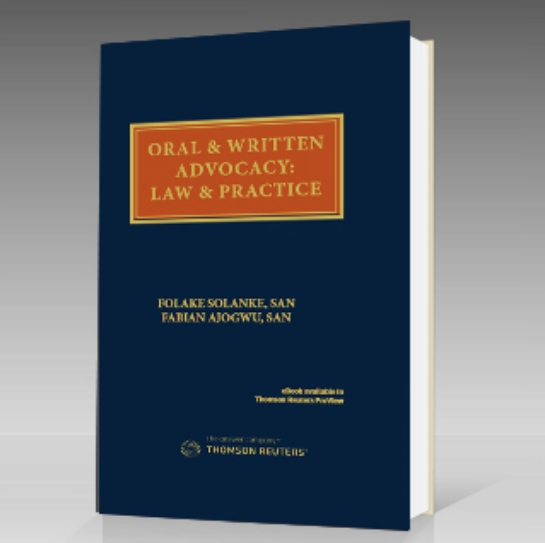Advocacy, be it oral or written, is the professional specialty of advocates, otherwise known as lawyers. When my cerebral and accomplished learned friend of the Silk – Dr. Fabian Ajogwu SAN (as he then was) – wrote to me in 2014 inviting me to be the lead author of this previous book, the word “advocacy” leapt out of the title of the proposed book. It immediately captured my professional interest. The reason was that, in that year, I had already spent fifty-one years of my life in the practice of serious advocacy, with thirty-three years of them, as the first female Senior Advocate of Nigeria. Praise be to God. I very much appreciate the gracious invitation.
I contemplated the fact that the learned SAN, like me, must also possess a tremendous passion for advocacy. Thus, I accepted the invitation to engage in the intellectual and professional leadership challenge. Perhaps, if the title of the book had not included the magical word “advocacy”, I might not have responded in the affirmative. I congratulate Fabian – The Prolific Write – for the brilliant choice of attractive and compelling title to wit: “Oral and Written Advocacy: Law and Practice (Traditional and Modern Trends in Advocacy)”.
Work on this book was enormous and scholarly. The research was intense and the writing and review sessions were numerous. There was tremendous investment of resources in time, energy and unreserved industry. Nonetheless, we are both so enamoured of the law and advocacy, that the sheer gruelling labour required in writing the book was a happy professional adventure. The book project has been intellectually stimulating. Our approach was to endeavour to advocate very distinctly and powerfully what qualitative legal advocacy entails; and, contribute to legal and academic scholarship.
I believe, with all due modesty, that we achieved our professional objectives.
Indeed, oral advocacy predated written advocacy. However over time, the extraordinary amount of time, the huge costs expanded on court trials, the congestion and the abysmal lack of adequate infrastructure in the law – courts, eventually caused a gradual shift towards a preference of written advocacy to oral advocacy, first in the United States of America, thereafter in the United Kingdom, Nigeria and elsewhere, it must be acknowledged that most lawyers, over the centuries, right from the time of ancient Rome till now, have been extremely enamoured of oral advocacy skills in the public theatre of the courtroom. Oratory and rhetorics were special courses of study in ancient Greek and Roman culture. Modern-day advocates are better advised to engage in such studies!
However, the courts and the lawyers have now accepted the ascendancy of written advocacy because it saves time and costs of litigation or should! Consequently, now, only a limited time is, with much regret, allowed by the court rules for oral advocacy.
It is trite to state that in Nigeria, English is the language of the court. Consequently, lawyers are professionally obliged to improve their English language and expand their vocabulary in order to be coherent in their limited oral advocacy and to spend the available time most effectively and persuasively. Certainly, there is no luxury of time within the available time for bogus or illogical arguments or sterile and convoluted submissions.
The need to engage in superior advocacy is emphasis in Order 6 Rule 3 of the Supreme Court Rules 1983 which provides:-
Failure on the part of an applicant… to present with accuracy, brevity and precision whatever is essential to the clear and adequate understanding of the questions which require consideration shall be a sufficient reason for refusing the application.
This rule is a definitive affirmation of the professional responsibility of every learned counsel to cultivate lucidity of thought, simplicity and cogency in oral and written advocacy. We make bold to advocate that lawyers must through their brilliant oral and written advocacy, demonstrate that they are truly “learned” to wit: that they know the law.
It is incontrovertible that lawyers are public performers in the public arena of courtroom. Thus, the public perception of lawyers places upon as advocates the professional obligation to perform our duties tenaciously, either as learned counsel for the claimant (plaintiff) or defendant in civil cases or, as learned counsel for the prosecution, or learned counsel for the accused in a criminal case. Indeed, perhaps lawyers have themselves to blame for the partial loss of oral advocacy because of the inept and inordinate submissions of some lawyers.
However, as lawyers, we are expected to encourage the settlement of disputes when the circumstances so dictate. As the 16th President of the United States of America, Abraham Lincoln, once advised:
Discourage litigation: Persuade your neighbors to compromise whenever you can. Point out to them how the nominal winner is often a real loser – in fees, expenses and waste of time. As a peace-maker, the lawyer has a superior opportunity of being a good man. There will still be a business enough.
As the co-authors of this unique book, we cherish the intellectual and literary opportunity to place on record our undiluted commitment to legal advocacy. With all due modesty, we present the book to the legal profession (the Bench and the Bar), the public and posterity. By so doing, we entertain the belief that we are helping to project “the glory of justice and the majesty of the law” as declared by the United States Attorney-General.
I make bold to declare, with all due modesty, that the book is sui generis!
Chief ‘Folake Solanke SAN, CON,
B.A., Dip.Ed., HLR, FNIALS,
LL.D (h.c.), D. Litt (h.c.), D.Lit. (h.c.), D. Litt (h.c.) FiOD, FCIArb,
Lead Author
Alabukun Law Chambers, Ibadan
21st day of March 2016


